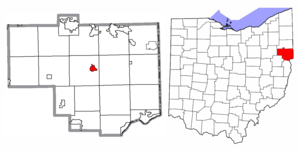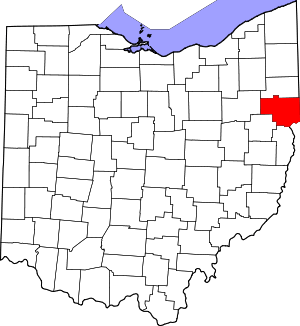Lisbon, Ohio
Lisbon is a village in Center Township, Columbiana County, Ohio, United States. The population was 2,821 at the 2010 census. It is the county seat of Columbiana County.[6] Lisbon is located in the Salem, OH Micropolitan Statistical Area, as well as the southern part of the greater Mahoning Valley.
Lisbon, Ohio | |
|---|---|
| Village of Lisbon | |
 Flag | |
 Location of Lisbon in Columbiana County and in the State of Ohio | |
| Coordinates: 40°46′26″N 80°46′3″W | |
| Country | United States |
| State | Ohio |
| County | Columbiana |
| Government | |
| • Type | Mayor-Council |
| • Mayor | Peter Wilson (I) |
| Area | |
| • Total | 1.68 sq mi (4.36 km2) |
| • Land | 1.68 sq mi (4.36 km2) |
| • Water | 0.00 sq mi (0.00 km2) |
| Elevation | 968 ft (295 m) |
| Population | |
| • Total | 2,821 |
| • Estimate (2019)[4] | 2,640 |
| • Density | 1,567.70/sq mi (605.29/km2) |
| Time zone | UTC-5 (EST) |
| • Summer (DST) | UTC-4 (EDT) |
| ZIP code | 44432 |
| Area code(s) | 330, 234 |
| FIPS code | 39-44030[5] |
| GNIS feature ID | 1065006[2] |
| School District | Lisbon Exempted Village |
| Website | http://www.lisbonvillage.com/ |
The modern drinking straw was invented and was patented in Lisbon.[7][8]
History
New Lisbon was platted on February 16, 1803, by Lewis Kinney as the second town in Ohio, named after the Portuguese capital city of Lisbon.[9] The village was incorporated under a special act of legislature on February 7, 1825.[10] Originally known for its iron and whiskey production, New Lisbon became an economic hub of many sorts into the first industrial revolution.[11] During this time, the village claimed the county's first bank, the Columbiana Bank of New Lisbon, its first insurance company, and the first Ohio newspaper, The Ohio Patriot, founded by an Alsatian immigrant, William D. Lepper.[12] The village was renamed to Lisbon in 1895.[13]
Lisbon has the distinction of being the northernmost western town involved in military actions during the American Civil War. Confederate cavalry officer John Hunt Morgan surrendered to New Lisbon Militia forces in West Point at the end of Morgan's Raid into Ohio.[14]
Geography
Lisbon is located at 40°46′26″N 80°46′3″W (40.773874, -80.767553).[15]
The following highways pass through Lisbon:
According to the United States Census Bureau, the village has a total area of 1.69 square miles (4.38 km2), all land.[16]
Demographics
| Historical population | |||
|---|---|---|---|
| Census | Pop. | %± | |
| 1810 | 303 | — | |
| 1820 | 746 | 146.2% | |
| 1830 | 1,129 | 51.3% | |
| 1860 | 1,381 | — | |
| 1870 | 1,569 | 13.6% | |
| 1880 | 2,028 | 29.3% | |
| 1890 | 2,278 | 12.3% | |
| 1900 | 3,330 | 46.2% | |
| 1910 | 3,084 | −7.4% | |
| 1920 | 3,113 | 0.9% | |
| 1930 | 3,405 | 9.4% | |
| 1940 | 3,379 | −0.8% | |
| 1950 | 3,293 | −2.5% | |
| 1960 | 3,579 | 8.7% | |
| 1970 | 3,521 | −1.6% | |
| 1980 | 3,159 | −10.3% | |
| 1990 | 3,037 | −3.9% | |
| 2000 | 2,788 | −8.2% | |
| 2010 | 2,821 | 1.2% | |
| Est. 2019 | 2,640 | [4] | −6.4% |
| source:[17] | |||
2010 census
As of the census[3] of 2010, there were 2,821 people, 1,138 households, and 693 families residing in the village. The population density was 1,669.2 inhabitants per square mile (644.5/km2). There were 1,287 housing units at an average density of 761.5 per square mile (294.0/km2). The racial makeup of the village was 97.4% White, 1.1% African American, 0.2% Native American, 0.2% Asian, 0.2% from other races, and 0.9% from two or more races. Hispanic or Latino of any race were 1.2% of the population.
There were 1,138 households, of which 30.1% had children under the age of 18 living with them, 42.4% were married couples living together, 13.0% had a female householder with no husband present, 5.5% had a male householder with no wife present, and 39.1% were non-families. 34.2% of all households were made up of individuals, and 13.4% had someone living alone who was 65 years of age or older. The average household size was 2.35 and the average family size was 3.00.
The median age in the village was 39.6 years. 23.1% of residents were under the age of 18; 9% were between the ages of 18 and 24; 24.3% were from 25 to 44; 28.1% were from 45 to 64; and 15.5% were 65 years of age or older. The gender makeup of the village was 47.3% male and 52.7% female.
2000 census
As of the census[5] of 2000, there were 2,788 people, 1,133 households, and 696 families residing in the village. The population density was 2,521.1 people per square mile (969.8/km2). There were 1,253 housing units at an average density of 1,133.0 per square mile (435.8/km2). The racial makeup of the village was 97.74% White, 0.90% African American, 0.22% Native American, 0.22% Asian, 0.04% Pacific Islander, 0.29% from other races, and 0.61% from two or more races. Hispanic or Latino of any race were 0.61% of the population.
There were 1,133 households, out of which 30.1% had children under the age of 18 living with them, 46.5% were married couples living together, 11.9% had a female householder with no husband present, and 38.5% were non-families. 34.3% of all households were made up of individuals, and 16.8% had someone living alone who was 65 years of age or older. The average household size was 2.37 and the average family size was 3.07.
In the village, the population was spread out, with 24.9% under the age of 18, 8.8% from 18 to 24, 27.8% from 25 to 44, 22.6% from 45 to 64, and 15.9% who were 65 years of age or older. The median age was 38 years. For every 100 females, there were 89.7 males. For every 100 females age 18 and over, there were 87.0 males.
The median income for a household in the village was $27,841, and the median income for a family was $36,707. Males had a median income of $29,271 versus $19,826 for females. The per capita income for the village was $14,097. About 10.1% of families and 14.1% of the population were below the poverty line, including 13.4% of those under the age of 18 and 5.2% of those 65 years or over.
Education
Children in Lisbon are served by the Lisbon Exempted Village School District. The current schools in the district are:
- McKinley Elementary School – 441 E Chestnut Street, grades K-5
- David Anderson Junior-Senior High School – 260 W Pine Street, grades 6-12
The school's athletic teams are known as the Blue Devils. The most heavily followed athletic programs at Lisbon's high school are football and basketball. Most notable is Lisbon's 1995 Division V State Championship in football, the only such championship in that sport ever to be held by a Columbiana County school. Other sports include track, swimming, golf, cross country, baseball, softball, volleyball, and cheerleading.
The Columbiana County Career and Technical Center is immediately south of city limits.
Culture
The Dulci-More Festival, a music festival dedicated to the Appalachian dulcimer and other traditional musical instruments, was inaugurated in 1995 and takes place each Memorial Day weekend at Camp McKinley, a Boy Scout camp near Lisbon.[18] Lisbon also is the host city to the Columbiana County Johnny Appleseed Festival and Columbiana County Fair.
Folk band Bon Iver paid tribute to the village in the instrumental song "Lisbon, OH", from their 2011 Grammy Award-winning album Bon Iver, Bon Iver.
Notable residents
- William W. Armstrong – journalist
- George M. Ashford – U.S. surveyor, pioneer of Arctic Alaska
- Reasin Beall – U.S. Representative from Ohio's 6th District
- Jacob L. Beilhart – communitarian leader, founder of Spirit Fruit Society
- Lucretia Longshore Blankenburg – suffragist and writer
- William T. H. Brooks – U.S. Army Major General
- John C. Chaney – U.S. Representative from Indiana's 2nd District
- John Hessin Clarke – U.S. Supreme Court Associate Justice
- Charles D. Coffin – U.S. Representative from Ohio's 17th District
- Katy Easterday – football and basketball player with the Pittsburgh Panthers and later collegiate football and basketball coach
- George A. Garretson – U.S. Army Brigadier General
- John M. Gilman – politician who served in the Ohio and Minnesota House of Representatives
- Howard Melville Hanna – businessman
- Mark Hanna – U.S. Senator from Ohio
- Andrew W. Loomis – U.S. Representative from Ohio's 17th District
- Daniel McCook – member of the Fighting McCooks
- George Wythe McCook – 4th Ohio Attorney General, member of the Fighting McCooks
- Henry Christopher McCook – clergyman and author, member of the Fighting McCooks
- John James McCook – lawyer and professor, member of the Fighting McCooks
- Robert Latimer McCook – member of the Fighting McCooks
- Roderick S. McCook – member of the Fighting McCooks
- Betty McKenna – All-American Girls Professional Baseball League third basewoman
- William McKinley Sr. – pioneer of the iron industry in East Ohio, father of President William McKinley
- Thayer Melvin – 4th West Virginia Attorney General
- James D. Moffat – 3rd President of Washington & Jefferson College
- William Duane Morgan – newspaper editor and politician
- Stephen Paxson – missionary who started over 1,300 Sunday schools in the American frontier
- Robert Walker Tayler – U.S. Representative from Ohio's 18th District
- John Thomson – U.S. Representative from Ohio's 6th, 12th, and 17th Districts
- Clement Vallandigham – copperhead leader and U.S. Representative from Ohio's 3rd District
References
- "2019 U.S. Gazetteer Files". United States Census Bureau. Retrieved July 28, 2020.
- "US Board on Geographic Names". United States Geological Survey. 2007-10-25. Retrieved 2008-01-31.
- "U.S. Census website". United States Census Bureau. Retrieved 2013-01-06.
- "Population and Housing Unit Estimates". Retrieved May 21, 2020.
- "U.S. Census website". United States Census Bureau. Retrieved 2008-01-31.
- "Find a County". National Association of Counties. Retrieved 2011-06-07.
- ""Sucker" U.S. Patent". United States Patent and Trademark Office. Retrieved 2018-08-12.
- "Lisbon Village History". Village of Lisbon. Retrieved 2018-08-12.
- Overman, William Daniel (1958). Ohio Town Names. Akron, OH: Atlantic Press. p. 76.
- Mack, Horace (1879). History of Columbiana County, Ohio: With Illustrations and Biographical Sketches of Some of Its Prominent Men and Pioneers. Unigraphic. p. 107.
- "Lisbon Village Website". Village of Lisbon. Retrieved 2018-08-12.
- Robert E. Cazden (1998). "The German Book Trade In Ohio Before 1848". Ohio History. 84: 57–77.
- McCord, William B. (1905). History of Columbiana County, Ohio and Representative Citizens. Biographical Publishing Company. pp. 269.
- Mahoning Valley Civil War Round Table Archived 2005-10-18 at the Wayback Machine
- "US Gazetteer files: 2010, 2000, and 1990". United States Census Bureau. 2011-02-12. Retrieved 2011-04-23.
- "US Gazetteer files 2010". United States Census Bureau. Archived from the original on 2012-07-02. Retrieved 2013-01-06.
- "Census of Population and Housing". United States Census Bureau. Retrieved 2014-01-20.
- "Dulci-More Festival 14". billschillingmusic.googlepages.com. Retrieved 20 April 2018.
